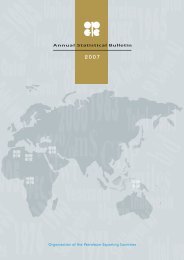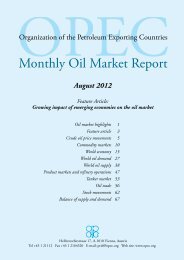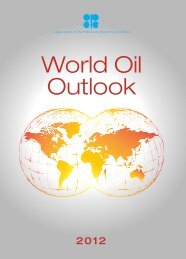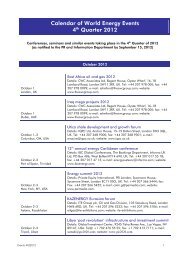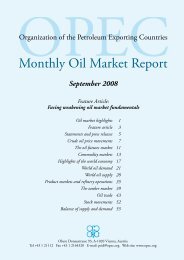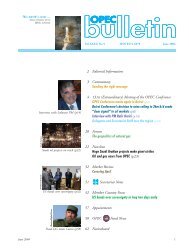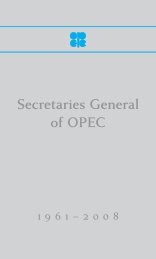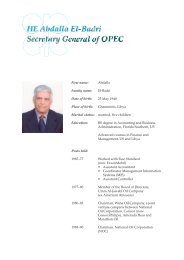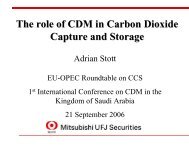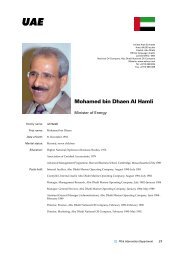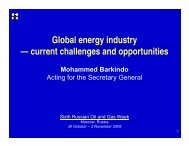2002 - OPEC
2002 - OPEC
2002 - OPEC
You also want an ePaper? Increase the reach of your titles
YUMPU automatically turns print PDFs into web optimized ePapers that Google loves.
market following the slide in the final months of 2001, and brought prices back within the price band,<br />
underlining the need for continued co-operation as a long-term necessity, rather than a short-term<br />
solution. The <strong>OPEC</strong> Reference Basket price started the year at a low of $18.33 per barrel for January<br />
and ended in December at a high of $28.39/b. The Basket recorded a yearly average of $24.36/b,<br />
just a few cents shy of the middle of the band range.<br />
<strong>OPEC</strong> stuck to its output quotas throughout the year in order to maintain market stability and in light<br />
of the expected weakness in demand. The oil market tightened in response to lower supply, and fear<br />
of a war in Iraq created uncertainty in the market. Although prices started the year well below the price<br />
band’s lower limit of $22/b, by March they had successfully been brought back into the band’s range.<br />
Subsequently, prices in the second quarter (and indeed for the rest of the year) were much healthier<br />
than in the two previous quarters, with the average Basket price lying in the range of $23–25/b in<br />
April–June. However, with a possible US-led invasion in Iraq looming, the market remained volatile<br />
and the so-called war premium began to push prices higher.<br />
Developments in the third quarter of the year were mainly influenced by the summer driving season<br />
in the northern hemisphere and uncertainty about the near-term outlook for the world economy. The<br />
true extent of the global economic recovery, particularly in the leading industrialized nations, remained<br />
unclear.<br />
Moderate global economic growth rates were expected before year-end, with normal seasonal growth in<br />
demand being expected for the fourth quarter. <strong>OPEC</strong>, therefore, decided that its production agreement<br />
would remain unchanged. The market was well supplied with oil and in November there was a general<br />
softening of the price structure, by several dollars a barrel. However, various factors including continuing<br />
fears of a possible supply disruption from Iraq resulted in a sharp increase in prices on world oil markets<br />
in December. Overall, however, the annual average price for the whole of <strong>2002</strong> remained comfortably<br />
inside the price band of $22–28/b.<br />
Continued oil market stability requires the development of a long-lasting and mutually beneficial<br />
partnership between <strong>OPEC</strong> and non-<strong>OPEC</strong> producers. <strong>OPEC</strong>, therefore, will continue to make every effort<br />
to further these promising partnerships in order to enhance mutual understanding and co-operative<br />
dialogue amongst energy-producing and energy-consuming countries alike.<br />
HE Dr Alvaro Silva-Calderón<br />
Secretary General<br />
5



